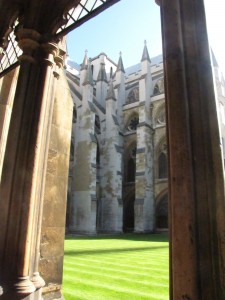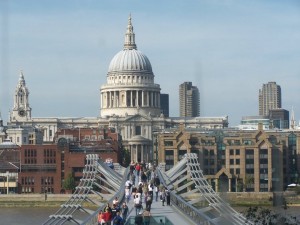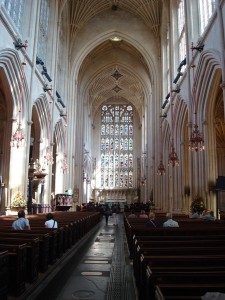September 19th, 2010 · No Comments
One of the things that has truly surprised me during our time in London and in our readings over the summer was the lack of a widespread religious sentiment and a growing secular way of thinking. Visiting the different places of worship for me has been very enriching. I sincerely enjoyed hearing about the way different roles of various institutions in their communities. Despite this growing secular sentiment, it was evident to me that faith is still an important key to Englishness. Sure, we may not have had the same treatment at the Christian institutions we visited, but we weren’t at the parish church where they would have stressed the other parts of Christianity outside of the famous dead people.
At the mandir, mosque, and synagogue, I did learn something about other faith communities, all of which I wasn’t that familiar with. Familiar with Christian outreach, it was interesting to hear the way other faiths volunteer and conduct outreach. I was also intrigued by the amount of history each guide mentioned; at the mandir, there was a specific exhibit to help you understand the history and beliefs of Hinduism. At the mosque, the guide spent more time on the basic principles, whereas at the synagogue it was much more history heavy, which I enjoyed (despite the slight mix up with who declared the crusades and who ordered Richard’s). Yet, they all stressed the importance of the community and what they did for the community. At the end of each tour, I felt that I had been where a faith was active and thriving- counteracting the general arguments we had encountered.
Before I talk about my favorite experience, I’m going to go off on a bit of rant/tangent. (Nothing unusual, you’re probably thinking.) While Christianity is undeniably not as much on the forefront as it once was (I sometimes forget I’m not in the Middle Ages where the church was as influential as those in political power and grotesques littered the cathedral for unknown reasons), it is still playing an important role in England. How? Most noticeably, the concerts we’ve attended. Sure, they haven’t been lectures in Christianity, but they have brought people into a church where they were witnessing a faith community. You don’t necessarily have to have a lecture about the religion’s history when you are there in order to spark an interest. Sometimes a few trips for concerts or to be a tourist will spark an interest and prompt someone to ask a question that leads to a serious discussion. Yes, it would have been nice to have left any of the churches/cathedrals with a pamphlet on basic Christianity, but because those audiences (presumably) weren’t there to learn about Christianity, a pamphlet may have been more alienating than encouraging.
Okay, so my favorite experience and what it taught me. Hands down, my favorite has been (no surprises) Westminster Abbey. (This may change as I’m hoping to get over to St. Bartholomew the Great tomorrow; it’s a medieval parish church.) Why when it didn’t actually teach me about Christianity or the abbey that I didn’t know? One, because it inspired my faith through the sweeping architecture and stained glass. For me, those are more impressive and awe-inspiring than St. Paul’s (in its present Wren-wrecked – okay, so maybe that’s a bit harsh-state) could ever dare to be. Two, because as a medievalist, I was able to participate in a long-standing tradition: the pilgrimage. Throughout history, people have visited sites throughout the world for many reasons. At Westminster Abbey, everything I love was combined into one place: my faith, grotesques, cosmati, saints, Chaucer, Gothic architecture, etc. I was on a pilgrimage of sorts. True I wasn’t there to pay my respects to Edward per se, but I can’t deny seeing the tomb of such an important figure didn’t give me chills (even though it’s been really messed up and reassembled incorrectly). I didn’t necessarily have to learn anything about Christianity to have an incredible experience. Yet, to say I didn’t learn anything is mistaken. I did, but I learned more about the position of the Church of England. It is clearly in decline, but the abbey is doing what it can given its monumental dual-purpose (protect priceless art and architecture while spreading its Christian message).

I’m sure some of us would argue that it is up to these major institutions to take the lead in revitalizing Anglicanism, and to some extent Christianity, in England. However, because Westminster Abbey stands for so much more than just Christianity (whether this is a good or bad thing is up for debate), it is important for some of the parish churches to be more vocal on these issues. For Westminster Abbey (and to some extent St. Paul’s) to take a major stand is a conflict of interests, a problem that lays at the heart of its problems rises: should it risk alienating the audience that helps it survive in order to promote its beliefs? It shouldn’t compromise its faith (and I don’t think it does; it does remain closed for services on Sundays as well as hosts small prayers and services throughout the day/week) in order to protect its architecture, nor should it compromise its architecture to protect its faith. They go hand-in-hand in many regards. Without either, you lose part of the abbey. If there was ever a lose-lose, impossible to win situation, double-edged sword, etc, this was it!
I’m hoping as I visit other major medieval cathedrals, a solution to the Christianity vs. tourism problem will become evident, but for now Westminster Abbey will have to be simply (as its Cloister represented for its medieval monks) my paradise on earth.
Tags: 2010 Stephenie · Churches and Cathedrals
September 15th, 2010 · 7 Comments

After visiting several religious sites, including St. Paul’s Cathedral, Westminster Abbey, the Shri Swaminarayan Mandir, and the East London Mosque, I have noticed two prevailing influences on places of religious worship in London: government involvement and tourism. Given England’s history of combining church and state, and the level of tourism in London, it is no wonder that one finds these influences, to varying degrees, in places of religious worship around the city. What is debatable is what effect tourism and government have on religious life and the worship within each of these buildings. In my opinion, churches, temples, synagogues, mosques, and the like may receive some benefits from tourism and a close relationship of Church(capital c, intending to refer to institutions) and State. However, on the whole, the influence of the government and the need to attract tourists lead to some troublesome trends in London’s places of religious worship.
By declaring a national religion, a country will very likely run into one of two scenarios. Either a small central government, such as a monarch, will use the national religion as a way to increase power and authority, and will persecute anyone who does not agree with their religious views. One can simply observe the history of the monarchy as they walk through Westminster Abbey, and see that this happened in England with the persecution, and massacre, of Catholics and others. This scenario has a horrible effect on religion, not to mention the human rights issues. If a ruler can influence the Church, then the Church’s message will quickly become distorted. Even if the ruler moves far away from the central texts and traditions of whatever faith is the national religion, there is no room for dissent. Historically, this situation has played itself out repeatedly.

The second scenario that can result from a combining of Church and State is what, in my view, is playing out in present day London. In this scenario, because the Anglican Church is the official religion for a nation that is increasingly secular and religiously diverse, the Church has become, frankly, bland. As a result, no one (or at, least, the intention is no one) is offended by the existence of a national religion. This also distorts the message of the Church, as governmental control has seemingly caused the Church to concentrate more on pleasing the masses than adhering to texts and traditions that could cause controversy. This “blandness” starts a vicious circle, as everyone involved in the Church sees no reason to attend anymore because it is no different than the world around them. This, in my view, is why when you go into St. Paul’s Cathedral or Westminster Abbey you don’t feel like there is an active faith community existent within the building. However, when we visited places like the Mandir or the East London Mosque one felt a sense of vibrancy and activity because these institutions are not as attached to the government. The lay leader at the synagogue suggested that combining Church and State has its advantages and disadvantages. Certainly, government involvement in religion has allowed students to become more educated in different faiths(Although exactly what they are learning and should be learning opens another can of worms) and governmental intervention allows the church to be funded, but is it worth watering down the principals of a major religion?

Picture obtained from http://www.mandir.org/
Almost as prevalent as the influence of government is that of tourism. Even the Mandir had a small museum you had to pay to enter (unless, of course, you had a London’s Visitor’s Pass-a card that also provides discounts at the gifts shops next to the crypt in St. Paul’s). From the perspective of the religious institutions, an influx of tourists allows you to share your belief system, but it’s a fine line between an educational experience and a money-making venture. At what point, and I don’t have an answer, does opening one’s place of religious worship become more about the cool architecture and less about the faith people are observing within the building? I am not saying any of the places we visited crossed such a line, but I know I am not the only one disturbed by the presence of gift shops in churches.
I am interested in seeing if Norwich’s places of religious worship, and in particular Norwich’s churches, differ from that of London’s. I do think we have seen people honestly observing faith here in London and I enjoyed many of the visits we made to these institutions. I simply think that they all, to wildly varying degrees, feel the effects, mostly negative, of tourists and government control.
Tags: 2010 Andrew
In the past week the Norwich Humanities group have visited numerous cathedrals, temples and Gurdwara ‘s and in these visits I have learned a great deal. In many of these religious venues I was uncomfortable simply because the ideologies/beliefs of these particular religions did not complement my own. Being taken out of my comfort zone to learn an experience the ways of other cultures, has given me some insight as to how these groups must feel when they are in a culture, and the majority is viewing them/. But as I went into these diverse places of worship, one major similarity caught my attention. In fact the concept of religion itself is all very similar to me.
Religion, in my definition, is when people have a shared belief in some form of the supernatural or higher power. It is a man made construct, that gives some people meaning and purpose for their lives. When visiting the places of worship over the past few weeks, this as a very prevalent commonality. But what was even more interesting was that the ideals and beliefs of these different religions were not all that different. Each form of religion has a belief system of what is “good religious behavior” and then “sins”. Every religion, has a written documents that tell the story of their lord, and some form a prayer, followed by various religious customs, and of course commandments or laws that must be followed accompanied by a place of worship. Why is it then that there are so many religions?
Visiting the different cathedrals temples etc. I found that when people have a faith, it can potentially be the strongest force that a man or woman can feel. So much so that even if others are unable to understand another person’s religion, to that specific individual, their religion is like second nature. I found this true for every religious venue I went to. Each person speaking about their faith had such a strong passion and emotional connection, that even if I could not understand “why”, I could not deny that their faith was beautiful.
The idea of religion is something that I can definitely appreciate but the reason that I am indifferent to religion in general (or at least the ones I have studied) is the prejudices and hypocrisy that comes with it. When I used to attend church I found that most of the people, who were attending this place of worship, were not holding true to the beliefs of Christianity. They would come in and do the general routine work and then leave. No one that I encountered had true faith or belief in not only what they were doing, but why. Then I began to research the history of various religions, and discovered that many besides being sexist, were prejudice and hateful towards other people in the past. Religion in my eyes became something that people followed blindly never questioning its routes or asking why, and as people began to ask why, newer religions began to form and others just followed along.
Religion is a very touchy subject, one that can never be understood. The fact that their now exist over 200 religions that all claim to be the truth or the chosen people is a battle that I don’t wish to enter. People have faith and I can respect it, but that is as far as I am willing to go, because at the end of the day, religion is just another hegemonic apparatus that is used to keep the subordinates in line. At least in my opinion. I have faith in people and their abilities and do believe that there is some force that is watching over me. This maybe lost loved ones, people who are far from me, family, or a higher power, I am unsure yet, but for right now faith is enough for me.
Tags: Anthony




